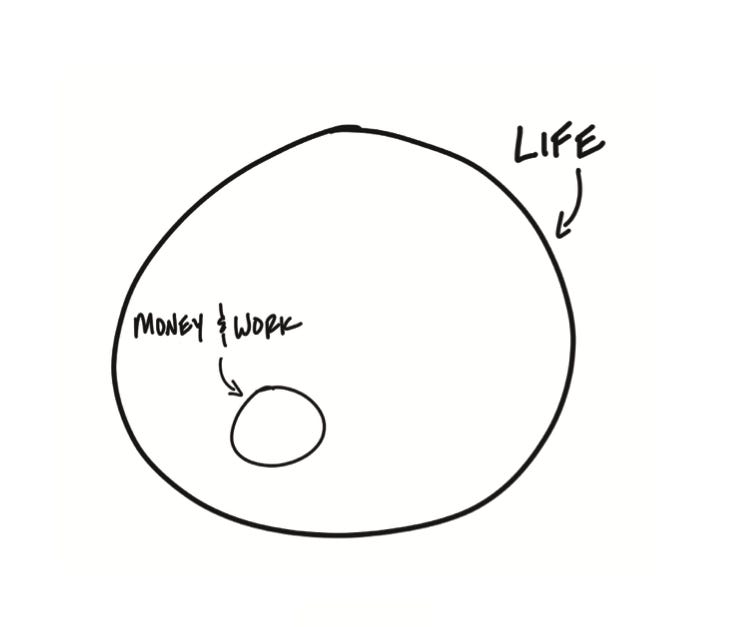Seven Sketches that Shifted How I See My My Work, Myself, and My Money - Part I
Reflections on a Conversation with Carl Richards
If there has been one person who has influenced my life and my career from a afar (who has no idea who I am), it would be Carl Richards. As a financial planning nerd, I’ve spent years soaking up Carl’s content. The Kitces and Carl podcast has made me a better financial planner. His 50 Fires podcast has helped me ask better questions about my own relationship with money. But more than anything, Carl’s simple, yet profoundly meaningful sketches, have shaped the way I think, particularly at the intersection of money and meaning.
Last week, I jumped at an opportunity to talk to Carl about his new book. Years ago, I wouldn’t have even sent him a message, because I didn’t feel worthy enough of his time. As I’ve worked on sitting comfortably next to my own imposter syndrome (think Ricky Bobby and the cougar in his car), I’ve slowly come to realize that if I don’t try to create meaningful opportunity in my life because I am afraid of disappointment or rejection, those opportunities aren’t going to come knocking at my door.
Carl and I talked about seven different sketches (and one bonus sketch) from his new book, Your Money, Reimagining Wealth in Simple Sketches. Over the course of the next couple of weeks, I’ll share one of his sketches from our conversation, along with Carl’s thoughts, and some reflections of my own.
Today, we are starting with a hard lesson I had to learn during my sabbatical: my work, and what I earn, does not define my life.
Life is More than Work and Money
When you go to a party or networking event, what’s inevitably one of the first questions you ask of a new acquaintance?
“What do you do for work?”
An only slightly better version of the question might be “What do you do for fun?”
We expect the answer will give us some profound insight into who our new acquaintance might be. In reality, we often construct our opinion based solely on what they do for work, how much they make (though it’s taboo to ask directly, we still can make a judgement), who they might know, or what list of activities they take up in their free time.
What we are really asking the person standing across from us is “Who are you?”
And we use their answer to put them neatly into little boxes that help us better understand the world.
This person is a hard worker. This person experienced a trauma. This person is successful.
Asking what someone does for work or for fun is just a tool for us to organize them. But it sets them up with an impossible task of answering the question in a meaningful way.
I struggled with this question during my sabbatical. When someone would ask, I had a hard time responding without stumbling through an answer….”I’m currently not working, but I’m a solopreneur…kinda. And I’m traveling and doing a lot of cooking, and oh, I started writing again!”
I was quietly screaming “I promise I’m still a productive human being even if I’m not working 9-5.”
But what does it matter? I didn’t lose any kind of worth just because I didn’t have a job (this would take me several months to realize). In fact, removing work gave me the space to explore and remind myself of who I really am and what is most important.
As I look back on my response, my answer should have just been “I’m working on slowing down and being present in a busy mind and a busy world.”
So I would invite you to ask yourself…Is your work who you are? And if the answer is no, consider these questions next time you meet someone at a cocktail party:
What are two things that have brought you joy this year?
What’s the most influential book you’ve read?
When was the last time you were scared?
If money didn’t matter, what would you do?
I asked Carl why money and work dominate our lives, particularly here in the United States. His best insight:
”What I’ve noticed really clearly was work and money was the organizing principles in our lives.
The question he would add…”Does it have to be that way?”
You can hear more of Carl’s story in the clip below.



